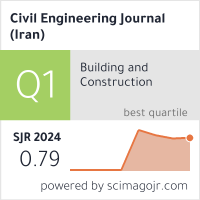Performance Optimization of Masonry Mortar with Marble Dust, Spent Coffee Grounds, and Peanut Shell Ash
Downloads
Doi:10.28991/CEJ-2025-011-03-09
Full Text:PDF
Downloads
[2] Morgun, V. N. (2023). About Dynamics of Improving the Foam Concrete Technological and Operational Properties upon Disperse Reinforcement with Polypropylene Fibers. Modern Trends in Construction, Urban and Territorial Planning, 2(4), 69–76. doi:10.23947/2949-1835-2023-2-4-69-76.
[3] Chiadighikaobi, P. C., Hasanzadeh, A., Hematibahar, M., Kharun, M., Mousavi, M. S., Stashevskaya, N. A., & Adegoke, M. A. (2024). Evaluation of the mechanical behavior of high-performance concrete (HPC) reinforced with 3D-Printed trusses. Results in Engineering, 22. doi:10.1016/j.rineng.2024.102058.
[4] Chiadighikaobi, P. C., Hematibahar, M., Kharun, M., Stashevskaya, N. A., & Camara, K. (2024). Predicting mechanical properties of self-healing concrete with Trichoderma Reesei Fungus using machine learning. Cogent Engineering, 11(1), 2307193. doi:10.1080/23311916.2024.2307193.
[5] Hematibahar, M., Hasanzadeh, A., Kharun, M., Beskopylny, A. N., Stel'makh, S. A., & Shcherban', E. M. (2024). The Influence of Three-Dimensionally Printed Polymer Materials as Trusses and Shell Structures on the Mechanical Properties and Load-Bearing Capacity of Reinforced Concrete. Materials, 17(14), 3413. doi:10.3390/ma17143413.
[6] Stel'makh, S. A., Beskopylny, A. N., Shcherban', E. M., Mavzolevskii, D. V., Drukarenko, S. P., Chernil'nik, A. A., Elshaeva, D. M., & Shilov, A. A. (2024). Influence of corn cob ash additive on the structure and properties of cement concrete. Construction Materials and Products, 7(3), 2. doi:10.58224/2618-7183-2024-7-3-2.
[7] Pan, J., Feng, K., Chen, W., Xing, W., & Wang, Y. (2023). Carrot extract as bio-admixture for performance enhancement of tunnel lining concrete. Journal of Building Engineering, 75, 107036. doi:10.1016/j.jobe.2023.107036.
[8] Hakeem, I. Y., Amin, M., Zeyad, A. M., Tayeh, B. A., Maglad, A. M., & Agwa, I. S. (2022). Effects of nano sized sesame stalk and rice straw ashes on high-strength concrete properties. Journal of Cleaner Production, 370, 133542. doi:10.1016/j.jclepro.2022.133542.
[9] Shao, L., Ding, Z., Wang, S., Pan, K., & Hu, C. (2023). Effect of Organic Matter Components on the Mechanical Properties of Cemented Soil. Materials, 16(17), 5889. doi:10.3390/ma16175889.
[10] D'Eusanio, V., Bertacchini, L., Marchetti, A., Mariani, M., Pastorelli, S., Silvestri, M., & Tassi, L. (2023, June). Rosaceae Nut-Shells as Sustainable Aggregate for Potential Use in Non-Structural Lightweight Concrete. Waste, 1(2), 549-568. doi:10.3390/waste1020033.
[11] Liu, D., Zhang, B., Yang, Y., Xu, W., Ding, Y., & Xia, Z. (2018). Effect of Organic Material Type and Proportion on the Physical and Mechanical Properties of Vegetation-Concrete. Advances in Materials Science and Engineering, 2018. doi:10.1155/2018/3608750.
[12] Siddique, R. (2012). Utilization of wood ash in concrete manufacturing. Resources, Conservation and Recycling, 67, 27–33. doi:10.1016/j.resconrec.2012.07.004.
[13] Traore, Y. B., Messan, A., Hannawi, K., Gerard, J., Prince, W., & Tsobnang, F. (2018). Effect of oil palm shell treatment on the physical and mechanical properties of lightweight concrete. Construction and Building Materials, 161, 452–460. doi:10.1016/j.conbuildmat.2017.11.155.
[14] Zheng, W., Phoungthong, K., Lü, F., Shao, L. M., & He, P. J. (2013). Evaluation of a classification method for biodegradable solid wastes using anaerobic degradation parameters. Waste Management, 33(12), 2632–2640. doi:10.1016/j.wasman.2013.08.015.
[15] Bhatt, S. M., & Shilpa, S. (2014). Bioethanol production from economical agro waste (groundnut shell) in SSF mode. Research Journal of Pharmaceutical, Biological and Chemical Sciences, 5(6), 1210–1218.
[16] Duc, P. A., Dharanipriya, P., Velmurugan, B. K., & Shanmugavadivu, M. (2019). Groundnut shell -a beneficial bio-waste. Biocatalysis and Agricultural Biotechnology, 20, 101206. doi:10.1016/j.bcab.2019.101206.
[17] Ding, M., Satija, A., Bhupathiraju, S. N., Hu, Y., Sun, Q., Han, J., Lopez-Garcia, E., Willett, W., Van Dam, R. M., & Hu, F. B. (2015). Association of coffee consumption with total and cause-specific mortality in 3 large prospective cohorts. Circulation, 132(24), 2305–2315. doi:10.1161/CIRCULATIONAHA.115.017341.
[18] Murthy, P. S., & Naidu, M. M. (2012). Recovery of Phenolic Antioxidants and Functional Compounds from Coffee Industry By-Products. Food and Bioprocess Technology, 5(3), 897–903. doi:10.1007/s11947-010-0363-z.
[19] Roychand, R., Kilmartin-Lynch, S., Saberian, M., Li, J., Zhang, G., & Li, C. Q. (2023). Transforming spent coffee grounds into a valuable resource for the enhancement of concrete strength. Journal of Cleaner Production, 419, 138205. doi:10.1016/j.jclepro.2023.138205.
[20] Na, S., Lee, S., & Youn, S. (2021). Experiment on activated carbon manufactured from waste coffee grounds on the compressive strength of cement mortars. Symmetry, 13(4), 619. doi:10.3390/sym13040619.
[21] Mohamed, G., & Djamila, B. (2018). Properties of dune sand concrete containing coffee waste. MATEC Web of Conferences, 149, 01039. doi:10.1051/matecconf/201814901039.
[22] Horma, O., Channouf, S., El Hammouti, A., El Hassani, S., Miri, H., Moussaoui, M. A., & Mezrhab, A. (2024). Enhancing concrete sustainability using crushed peanut shells: An analysis of thermophysical properties, durability, and application potential in construction. Journal of Building Engineering, 90. doi:10.1016/j.jobe.2024.109434.
[23] Sani, J. E., Goddey, O. A., Kevin, O. K., & Anthony, R. (2023). Durability of concrete made with groundnut shell ash as cement replacement. Materials Today: Proceedings, 86, 145–149. doi:10.1016/j.matpr.2023.05.218.
[24] Usman, J., Yahaya, N., & Mohammed Mazizah, E. (2019). Influence of groundnut shell ash on the properties of cement pastes. IOP Conference Series: Materials Science and Engineering, 601(1), 12015. doi:10.1088/1757-899X/601/1/012015.
[25] Shcherban', E. M., Stel'makh, S. A., Beskopylny, A. N., Mailyan, L. R., Meskhi, B., Chernil'nik, A., El'shaeva, D., Pogrebnyak, A., & Yaschenko, R. (2024). Influence of Sunflower Seed Husks Ash on the Structure Formation and Properties of Cement Concrete. Civil Engineering Journal (Iran), 10(5), 1475–1493. doi:10.28991/CEJ-2024-010-05-08.
[26] Afzal Basha, S., & Shaikh, F. U. A. (2023). Suitability of marble powders in production of high strength concrete. Low-Carbon Materials and Green Construction, 1(1), 27. doi:10.1007/s44242-023-00029-z.
[27] Shooshpasha, I., Hasanzadeh, A., & Kharun, M. (2020). Effect of silica fume on the ultrasonic pulse velocity of cemented sand. Journal of Physics: Conference Series, 1687(1), 012017. doi:10.1088/1742-6596/1687/1/012017.
[28] Shooshpasha, I., Hasanzadeh, A., & Kharun, M. (2019). The influence of micro silica on the compaction properties of cemented sand. IOP Conference Series: Materials Science and Engineering, 675(1), 12002. doi:10.1088/1757-899X/675/1/012002.
[29] Pereira, P., Evangelista, L., & De Brito, J. (2012). The effect of superplasticizers on the mechanical performance of concrete made with fine recycled concrete aggregates. Cement and Concrete Composites, 34(9), 1044–1052. doi:10.1016/j.cemconcomp.2012.06.009.
[30] Puertas, F., Santos, H., Palacios, M., & Martínez-Ramírez, S. (2005). Polycarboxylate superplasticiser admixtures: effect on hydration, microstructure and rheological behaviour in cement pastes. Advances in Cement Research, 17(2), 77-89. doi:10.1680/adcr.17.2.77.65044.
[31] Alsharari, F. (2025). Utilization of industrial, agricultural, and construction waste in cementitious composites: A comprehensive review of their impact on concrete properties and sustainable construction practices. Materials Today Sustainability, 29, 101080. doi:10.1016/j.mtsust.2025.101080.
[32] íœnal, M. T., Hashim, H., Gökçe, H. S., Ayough, P., Köksal, F., El-Shafie, A., & Salman, A. M. (2024). Physical and mechanical properties of pre-treated plant-based lightweight aggregate concretes: A review. Construction and Building Materials, 444, 137728. doi:10.1016/j.conbuildmat.2024.137728.
[33] Turk, O., Yehia, S., Abdelfatah, A., & Elchalakani, M. (2024). Sustainable concrete production: The potential of utilizing recycled waste materials. Journal of Building Engineering, 98, 111467. doi:10.1016/j.jobe.2024.111467.
[34] Haddadian, A., Johnson Alengaram, U., Ayough, P., Mo, K. H., & Mahmoud Alnahhal, A. (2023). Inherent characteristics of agro and industrial By-Products based lightweight concrete – A comprehensive review. Construction and Building Materials, 397, 132298. doi:10.1016/j.conbuildmat.2023.132298.
[35] GB/T 17671-1999. (1999), Method of Testing Cements-Determination of Strength. National Standards of the People's Republic of China, Beijing, China.
[36] ASTM C109/C109M-20. (2020). Standard Test Method for Compressive Strength of Hydraulic Cement Mortars (Using 2-in. or [50-mm] Cube Specimens). ASTM International, Pennsylvania, United States. doi:10.1520/C0109_C0109M-20.
[37] Haastrup, S., Bí¸dker, M. S., Hansen, S. R., Yu, D., & Yue, Y. (2018). Impact of amorphous micro silica on the C-S-H phase formation in porous calcium silicates. Journal of Non-Crystalline Solids, 481, 556–561. doi:10.1016/j.jnoncrysol.2017.11.051.
[38] Yee, J. J., Khong, S. C., Tee, K. F., Jolius, G., & Chin, S. C. (2024). Spent coffee grounds enhanced compressive strength of cement mortar: an optimization study. Discover Applied Sciences, 6(7), 379. doi:10.1007/s42452-024-06077-9.
[39] Lee, J., Kim, J., & Lee, S. (2023). Study of Recycled Spent Coffee Grounds as Aggregates in Cementitious Materials. Recent Progress in Materials, 5(1), 1–23. doi:10.21926/rpm.2301007.
[40] Gwarah, L. S., Akatah, B. M., Onungwe, I., & Akpan, P. P. (2019). Partial Replacement of Ordinary Portland Cement with Sawdust Ash in Concrete. Current Journal of Applied Science and Technology, 4, 1–7. doi:10.9734/cjast/2019/v32i630036.
[41] Ikumapayi, C. M., Arum, C., & Alaneme, K. K. (2021). Reactivity and hydration behavior in groundnut shell ash based pozzolanic concrete. Materials Today: Proceedings, 38, 508–513. doi:10.1016/j.matpr.2020.02.385.
[42] Buari, T. A., Ademola, S. A., & Ayegbokiki, S. T. (2013). Characteristics Strength of groundnut shell ash (GSA) and Ordinary Portland cement (OPC) blended Concrete in Nigeria. IOSR Journal of Engineering, 3(7), 1-7. doi:10.9790/3021-03760107.
[43] Shahid, K. A., Ganesh, V., & Ghazali, N. (2024). The Incorporation of Spent Coffee Grounds as an Additive in Cement Ventilation Blocks. The Open Civil Engineering Journal, 18(1), 1-12. doi:10.2174/0118741495286280240206073611.
[44] Le, T. T., Park, S. S., Lee, J. C., & Lee, D. E. (2021). Strength characteristics of spent coffee grounds and oyster shells cemented with GGBS-based alkaline-activated materials. Construction and Building Materials, 267, 120986. doi:10.1016/j.conbuildmat.2020.120986.
- Authors retain all copyrights. It is noticeable that authors will not be forced to sign any copyright transfer agreements.
- This work (including HTML and PDF Files) is licensed under a Creative Commons Attribution 4.0 International License.![]()















